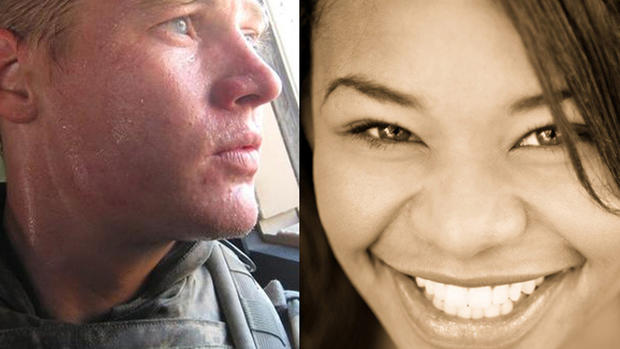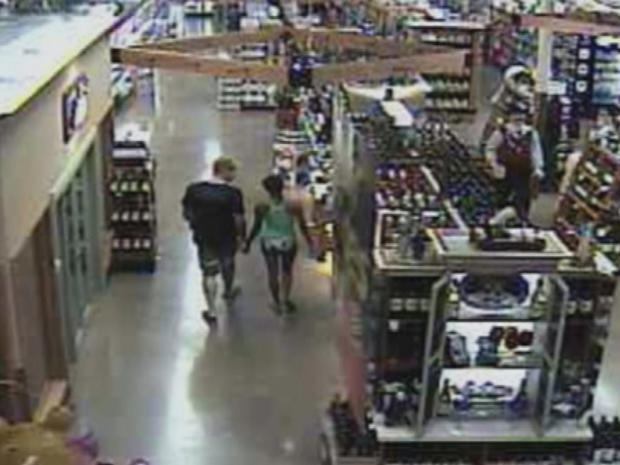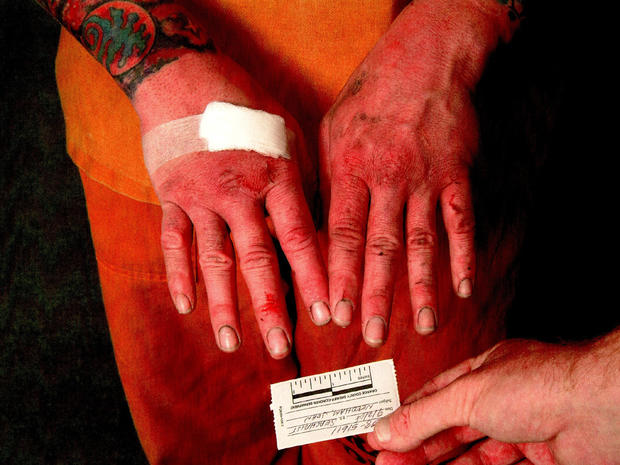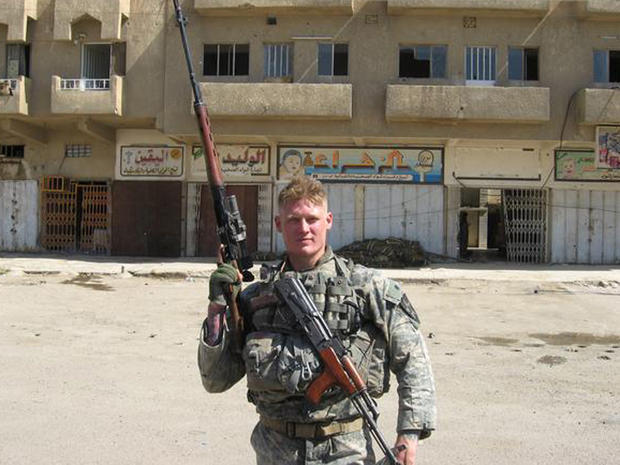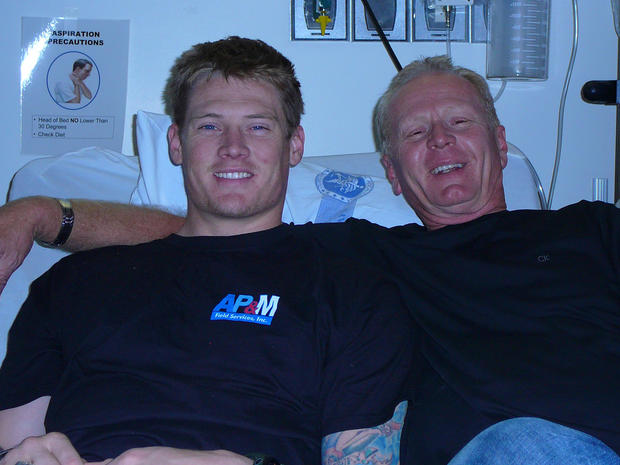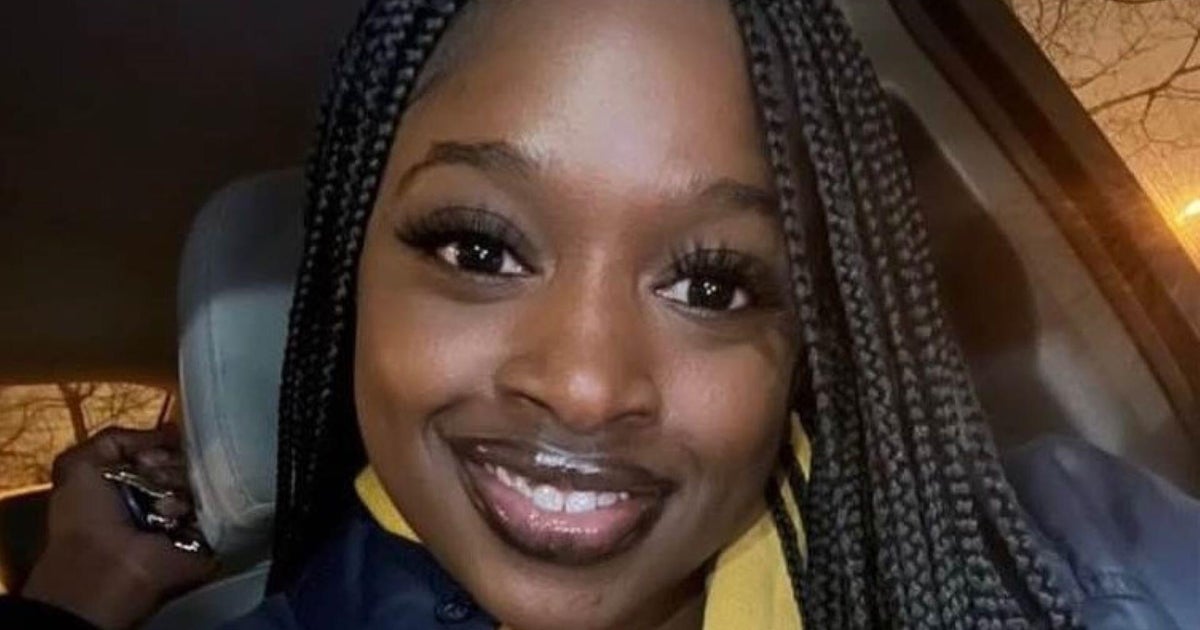War-damaged vet kills his girlfriend; Is PTSD to blame?
Produced by Chris Young Ritzen
[This story previously aired on Nov. 11, 2011]
(CBS) SAN CLEMENTE, Calif. - "That day and what happened that day is gonna be with me until the day I die. It's something I carry on my conscience every day," John Needham explained. "I just can't believe that this is where my life is right now. When I look back when I was younger, I never see myself at 26 years old being called a murderer.
"I was trained to kill. ...I come home. I can't adjust to regular civilian lifestyle," Needham continued. "I spun out of control. I needed help.
"Unfortunately, with the way I was trained, you know to react to threats is to neutralize threats. ...Even with someone I love."
In July of 2009, John Needham was out on bail, but far from a free man.
"I feel like a tagged animal," he said looking down at his ankle bracelet. "This is a constant reminder of what has happened and what is true reality no matter how much I try to hide from it or try and escape from it."
Needham was awaiting trial for a crime he found difficult to comprehend: killing a woman he says he loved.
"You know she was absolutely precious to me. She still is," he said.
Jacqwelyn Villagomez was 19 when she died and had only known John Needham for a few months. She'd been a track star in high school, and was hoping to break into modeling and acting.
Sarah and Spencer Savino were so close to Jacque they considered themselves sisters. At odds with her own family, Jacque lived with the Savinos for a year when she was 17.
"She had a really vivacious personality," Sarah Savino told "48 Hours" correspondent Troy Roberts. "They call it the Jacque glow. Like she just had this glow about her. From her big bright teeth and her smile."
"What did you learn about her life before she came into yours?" Roberts asked.
"I learned that her mom had passed away when she was very young. She lived with a grandmother and her brother," Sarah Savino replied. "Wasn't a very happy home. Just didn't feel loved. ...I don't think she had a sense of real belonging and what a real family life was like."
"And she found that with your family?"
"I believe that she did."
But when Villagomez graduated from high school and set off on her own, she struggled on and off with drugs. She had talent but drifted from job to job.
"She had her issues with...her mom dying very young of AIDS. She's had her drug addictions," John Needham explained. "She had her issues and I had my issues. I just got back from Iraq and we were both broken people. And we kind of mended well. We kinda helped each other."
It was Iraq that broke John Needham. After serving more than a year, he came home shattered physically and emotionally. He'd been diagnosed with post-traumatic stress disorder or PTSD.
"When people asked how John was, it was kinda like, 'I don't know. I don't know how John is because John's not here anymore. It's somebody else,'" his brother, Mike Needham Jr., explained.
Growing up, Mike Needham Jr. often teased his younger brother, but when John came home from Iraq, Mike grew concerned. John was edgy, had mood swings and flashbacks -- symptoms of PTSD.
"I remember one time I woke him up, and I woke him up out of his sleep because he was crying in his sleep, and John had got up, and he went to the corner of the room and took off all his clothes and then got into like a fighting stance, like he was gonna fight me," he recalled. "And then I had to turn the lights. And I'm like [claps] -- and I'm like, 'John what are you doing?' And then he snapped out of it."
To make matters worse, John Needham had severe back pain from combat injuries. He was prescribed a fistful of drugs and often downed them with alcohol.
"John was never a drinker, you know? Before he left, he -- he didn't drink alcohol," Mike Needham Jr. said. "But he came back, and he would drink and drink and drink and he was ... drinking -- drinking the pain away."
The drinking escalated when Jacque Villagomez moved in with John Needham. John's father, Mike Needham Sr., lived upstairs.
"To me, it was throwing gasoline on the fire," he told Roberts. "I had talked to him and said ... you know, it wasn't a good time to have a relationship and he needed to concentrate on his own rehabilitation."
But Villagomez stayed and their fragile relationship started to crumble. Three days before her death, she posted this angry message on John's Needham's MySpace page:
"I hope you ... overdose on sadness ... regret will take over your life until you are in so much pain that you take your own life!"
Mike Needham Sr. put his foot down. On Sept. 1, 2008, he insisted it was time for Villagomez to go.
"I said, 'Jacque I'm going to give you some money, we are going to get you a hotel, motel and we are going to help you get on your feet,'" he said. "She wasn't happy about it at all. She was really, really kinda distraught, upset."
The couple wasn't ready to say goodbye. A store security camera captured an image of them holding hands and buying vodka for what would be their last alcohol-fueled night together.
"I think that for both of us, we were on a downward spiral and it got to a boiling point to where you know, something was gonna happen," John Needham explained. "What it was, whether it was me dying, her dying, someone was gonna die."
According to Homicide Det. Joe Gaul of the Orange County Sheriff's Department, "There was blood spatter on the doorjamb, the wall, the bathroom door -- what we call impact patterns, somebody being struck and the blood spraying off of being struck."
Det. Gaul learned the bloodshed was sparked by a jealous rage -- Villagomez's. Earlier that evening, Jacque had finally agreed to move out. But just as she was leaving, an old girlfriend -- Renee Stoner -- showed up to visit John. Soon after, Jacque stormed back in.
"And Jacqwelyn was very upset that Renee was there at the house with John," Det. Gaul continued. "They got into a physical confrontation over that fact. John had separated both of them. And John was restraining Jacqwelyn while Renee escaped to the bathroom. Eventually John told her to get out of there."
Once outside, Stoner called 911, where she described Jacque Villagomez as the aggressor, not John Needham:
RENEE STONER: This girl just attacked me and ripped out half my f------ hair.
911 OPERATOR: And where is this girl at?
RENEE STONER: She's inside the house.
911 OPERATOR: Do you need the paramedics?
RENEE STONER: Um I don't know, she was hitting my head, but I feel fine. I'm just really shaken up.
"At that time [Stoner] didn't see any blood. She didn't witness any - beating or assault of any kind. She just left the scene," said Det. Gaul.
But something happened in the few minutes it took deputies to respond. When they found Jacque Villagomez, she was battered -- near death -- and would not survive. John Needham was naked, crying and smeared in blood. Deputies say Needham charged them and they had to use a Taser to subdue him.
"There was no evidence to indicate anything other than John's fists were used to beat Jacqwelyn," the detective said.
When Det. Gaul began his interview with John Needham, "he was still in a hospital gown. And his hands were wrapped in paper bags because we had already decided that we were going to try and extract some evidence from his hands down the road, we didn't want that to be contaminated."
When Det. Gaul and his partner questioned him, John had few answers:
INVESTIGATOR: What happened in that room? She had to do something to set you off, to pull the trigger, right?
JOHN NEEDHAM: I don't know [cries].
INVESTIGATOR You do know John.
JOHN NEEDHAM: I don't know! I don't know, OK!? I'm a vet, OK. I have issues, I get set off.
John Needham never was able to provide a clear explanation for the killing. He says as he struggled to restrain Villagomez, something inside of him snapped.
"I see it as -- just complete chaos," he explained. "Complete insanity. And -- and I've -- I see -- myself being uncontrollable. I -- I'm turning into an animal. There's you know … I never wanted this to happen."
WAS IT MURDER?
John Needham killed Jacque Villagomez with his bare hands, but to his father, this crime was not a murder.
"Should John be held responsible for Jacque's death?" Troy Roberts asked Mike Needham Sr.
"Absolutely. Absolutely," he replied. "But was it murder? No, it was not murder. Was it premeditated? No."
Mike Needham Sr. argues that if not for John's war wounds -- physical and psychological -- Jacque would be alive today.
"Do you think you might be making excuses for your son?" Roberts asked.
"No. Not at all," he replied. "If you don't have the mental capacity to know the difference between right and wrong, it doesn't make it OK. But, it is a different situation than consciously going out and killing somebody. And that's not what happened."
"You know there's a reason this happened and it's not just because I'm a monster," said John Needham.
To make his case, Needham allowed investigative reporter Michael de Yoanna and a team of filmmakers to dig into his life and document the story of his unraveling in Iraq.
"What other incident in my life besides being in combat would contribute to me being a murderer?" he told them.
In the late summer of 2009, John's extended family gathered at his grandfather's home to show him support before his trial.
"You can take the soldier out of the war, but you can't take the war out of the soldier. And John is a hero. John is a hero," Grandpa Northcross said at the gathering.
"I wouldn't say that," said John.
John Needham's family knows about courage, having served their country for five generations.
"This was my great, great uncle that perished in the Alamo," Grandpa Northcross explained of a photo.
John Needham's father was in Army intelligence and his father was in World War II. The Army seemed to be in his blood. "I think the best thing I'm capable of doing is being a soldier," John said. "And that'll be 'til the day I die."
In March 2006, John Needham followed in the footsteps of his father and grandfather and signed up. He was assigned to Fort Carson, Colo to a unit called the 2-12, nicknamed the "Lethal Warriors." By that fall, Pvt. Needham was in Baghdad.
"I was extremely gung-ho, motivated. You know: shoot, move, communicate, kill, kind of a soldier. And I did exactly what I was told," he explained. "Every single mission that we went on, people were lagging and getting kinda tired, not too motivated. I would always be in their face getting them ready, pumped up for the mission. And so, I got known as the Needhammer because I was just constantly the first one in the door to pound on things. Just, you know, 'don't get in my way.'"
Private Needham served with distinction, earning multiple honors including a Purple Heart and an Army Commendation Medal for protecting his team during an ambush.
"And that was the most intense situation of my life, being ambushed. I remember I was stuck behind a wall I was about this high," he motioned, "and being pinned down without my helmet and just remember feeling the impacts of the rounds hitting the concrete and then watching the whole wall in front of me just explode."
He survived multiple improvised explosive device (IED) and grenade attacks, but his bravery came at a price. Private Needham suffered concussions, shrapnel wounds and a fractured back.
"The very worst was it blasted my head up toward the top of the roof and I hit my head and which we later found out broke my T9 and T10 vertebrae, knocked me out. And went back on patrol the next day," he explained. "I went to the hospital and I was told by my command to tell them that everything's fine because if you tell them the truth or if you tell them something's wrong then they're going to take you out. And do you wanna be away from us? No."
But for John Needham, the psychological damage was even worse.
"It changed me completely. It's -- still something I think about, it's still something that I dream about," he said. "I've seen children -- children's bodies cut up, burnt and mutilated. ...To see women dead and women maimed. That will change you forever."
In June of 2007, his unit was ordered to shoot a man suspected of trying to detonate an IED.
"We engaged and killed him, dragged his body into the middle of the streets..." Then, according to Pvt. Needham, members of his unit did the unthinkable.
"They pulled open the cavity of the deceased's head and pulled out his brains, messed with his body a little bit. We put it on top of the Humvee without a body bag and drove it around the city to kind of show everyone this is what happens when you mess with us," he explained.
"I started not to care anymore," Pvt. Needham said. "I just tried personally to put myself in the most deadliest positions I can get into."
His emails to his brother became alarming.
"I could see an emotional slide with him towards the end there," Mike Needham Jr. said. "Instead of telling us he was OK and everything was fine, it was more of a matter of, 'Yes, I'm alive and if I'm alive tomorrow I'll send you an email.'"
"And I said to him, 'Listen, I said I'll do anything that you need me to do. Do you want to try to come home?" Mike Needham Sr. said. "Having my son come home whole was the most important thing."
There were more staggering blows for Pvt. Needham: That same summer, an IED wiped out five of his comrades. And just when he had allowed himself to think about going home, the orders came in extending his tour in Iraq.
"I lost touch with reality," he said.
A COMPLICATED STORY
For weeks afterwards, Pvt. John Needham tried to numb himself with whiskey. And when that didn't work, he picked up a gun.
"I pulled out my M-9 pistol. With my best friend Smith in the room. And, um, put the pistol up in the air, I charged it," he explained. "And he's like, 'what the f--- are you doing?' And I put it to my head and we wrestle. And the weapon discharges."
The bullet missed its mark and put a hole in the barracks wall. It was September 2007 and Pvt. John Needham had been in Iraq for 11 months.
"I snapped. I completely turned into something I didn't want to be and I didn't want to live anymore," he said.
But instead of getting immediate help, John Needham says he was punished.
"They treated him like a captive, like he was an enemy, an insurgent, basically held him captive in a small room," said Mike Needham Sr.
A soldier from Pvt. Needham's unit was in the barracks that night. He's speaking out in support of John, even though he fears reprisal from the Army.
"I'm curious, though, as to why you agreed to do it?" Roberts asked.
"Because the honest-to-God truth, I just feel like somebody should have said something earlier and nobody has done it yet, and I just wanted to do right," the soldier replied.
The soldier says after a few days, John was seen by an Army psychiatrist, but his isolation continued.
"For how long?" Roberts asked.
"I think it was about a month," the soldier replied.
And John Needham's commander insisted that he'd be watched by two soldiers night and day -- a task that angered his exhausted comrades.
"They were trying to embarrass him because he was seeking help?" Roberts asked the soldier.
"I think they were trying to do more than that. I think that they were trying to get it so that everyone turned against him," he replied.
"Did they?"
"I think nearly everyone did," the soldier replied.
"48 Hours" asked the Army for a response. The Army declined. But "48 Hours" obtained a sensitive Army document through the Freedom of Information Act that shows John Needham's superior did not see his action as a suicide attempt. Instead, he was recommended for a "general courts martial" for "being drunk, firing his weapon in the barracks."
And according to the document, this wasn't the first time John Needham had gotten himself into hot water. Months earlier, Needham, quote, "Got into trouble with pills, drugs and alcohol." And he had been demoted for it.
"John's story is quite complicated. There are many twists and turns in his story," said Michael de Yoanna, who wrote about Needham's case for Salon.com and came on board as a consultant for CBS News. He says he talked to many soldiers in John's platoon.
"They don't have a lot of sympathy for the fact that he might have been suffering from severe post-traumatic stress disorder," said deYoanna.
When word reached Mike Needham Sr., he scrambled to get his son out of Iraq.
"And I just started making phone calls, the Pentagon, anyone that would listen to me," he said.
After weeks of calls, John Needham was sent to Walter Reed Army Medical Center in Washington, D.C. There his condition was considered serious enough to hospitalize him for post-traumatic stress disorder.
"They really had good doctors at Walter Reed," John Needham said.
"John was receiving psychological care at Walter Reed. But then he was being taken out of that care against his own will and against the will of his family," said de Yoanna.
Had that not happened, Mike Needham strongly believes this story might have ended here -- that his son would never have gotten to the point of beating a young woman to death.
"There's no doubt about it. I'm convinced of that," he said. "He should have been in a hospital."
Mike Needham Sr. saw the move to Fort Carson as more punishment for his son. John was put back on duty and a court martial still hung over his head. Although he received medical care, John told his father he was under acute stress and getting worse.
"I love my son. And I knew the condition he was in ... I saw him as needing help," he said. "...He was sick. Very sick."
So Mike Needham Sr. fought hard and managed to get his son transferred to a military facility in San Diego, closer to home. In the months that followed, John bounced in and out of a string of hospitals, clinics and doctor's offices. Despite the fact that he had a problem with alcohol, his list of medications grew. He was prescribed drugs to treat his pain, depression, insomnia and PTSD. The effects were obvious.
"There was a timeline throughout the day where you could tell what medication John was on," Mike Needham Jr. explained. "There were times when he was in a good mood, there were times when he was just sleeping, there were times when he wouldn't say a word for hours on end. I was worried about the prescriptions and I told him quite a few times, you got to -- you got to do something about this."
But no amount of medicine could push Iraq from John Needham's thoughts. Feeling the weight, he sent a letter to Army brass detailing the events he saw as war atrocities committed by his unit.
"They pulled open the cavity of the deceased's head and pulled out his brains, messed with his body a little bit," he explained.
John Needham offered a graphic photo as evidence: A gloved hand holding what appears to be a brain.
"We put it on top of a Humvee without a body bag and drove it around the city to kinda show everyone this is what happens when you mess with us," he continued.
John Needham says he told Army investigators everything he knew.
"They took it all down, said "thank you for your information." I never heard anything about it again," he said.
But the Army document obtained by "48 Hours" shows an investigation was launched into John Needham's allegations of war crimes. The document by the Criminal Investigation Command is redacted and incomplete; 111 pages were withheld. But in the information provided, soldiers who were questioned about the photo gave responses similar to this one: quote, "We didn't have any body bags that day so we had to put him on the hood of the vehicle for transport."
Another described the gloved hand as picking up brain matter so no kids or dogs can play with it. The report concluded, quote, "The offense of War Crimes did not occur." And with no explanation, the court-martial hanging over John's head quietly went away.
In July 2008, nine months after being medevaced from Iraq, John Needham was given a medical discharge -- but he would never receive all the medals listed on his papers.
"And they just basically kind of kicked him to the curb," said Mike Needham Sr.
Days after his paperwork came through, Needham met Jacque Villagomez. Two months later, he was accused of murder and a friend would break the news to the Savino sisters that Jacque was gone.
"So I went upstairs to my mom and I'm like, 'It's true mom. She's dead,'" Spencer Savino said with a sniffle.
THE PTSD DEFENSE
In July of 2009, 10 months after Jacque Villagomez's death, John Needham was still being treated for PTSD. He went to the VA Medical Center in Long Beach, Calif., to see if he also had brain damage.
"I think they're going to find out that there's going to be some probably microscopic bleeding inside my head, maybe some scar tissue from the explosions and firefights that I've been in," he said.
In fact, the test confirmed that John Needham did have traumatic brain injury or TBI.
Dr. Richard Friedman is a Professor of Psychiatry at Weill Cornell Medical College.
"When you have trauma to the head ... it can cause permanent damage to regions of the brain," Dr. Friedman explained, "which can cause various kinds of problems, in terms of ... control of emotion, control of behavior, personality change."
As John Needham saw it, it was another piece of evidence that he was not in his right mind the night he killed Jacque Villagomez.
"TBI is something that ... affects you totally -- as a person as a whole. Everything from memory to speech to hearing to being able to pay attention," John Needham explained. "So, I believe that that's gonna play a big part in my case."
He would need all the help he could get; He was facing 25 years-to-life for murder.
"Somebody died. And John killed them. I don't think it was murder. I think it was, if anything manslaughter," said John's brother.
Mike Needham Jr. has never wavered in the defense of his brother since the night of the killing.
"I don't think he was aware of what had taken place to begin with. He had clearly gone through some -- some things and brain injuries that obviously affected how he was," he said.
"But, Mike, many soldiers see combat, but they don't come back and kill their girlfriends," said Roberts.
"Sure, but there's plenty that have, too. I thought he had a good defense," Mike Needham Jr. replied.
John's public defender, Michael Becker, felt he had a strong case. He'd tell the jury about John's multiple combat injuries and medications.
"In this particular instance I don't think we're going to have any problem with the PTSD defense. It's -- it's going to be our defense. But, you know, you're facing the potential of life in prison, so they will give more than enough time to investigate," said Becker.
With post-traumatic stress at the top of a long list.
"Prosecution is going to say that John got drunk and he killed his girlfriend out of a drunken rage. That's exactly what they're going to say," said Becker.
"Couldn't be further from the truth. And that's why I'm waiting for my day in court. Waiting for the truth to come out. It's the whole reason why we are doing this," said John Needham.
"There were two Johns," Orange County prosecutor Steve McGreevy said. "There was the John that when he was sober, and there was the John when he drunk."
McGreevy's take on the crime was exactly as expected. He says John was drunk and killed Jacque in anger. McGreevy says you can see John's rage in the interrogation tape:
JOHN NEEDHAM: I don't like your vibe. And I don't like the way you are f****** talking to me.
INVESTIGATOR: I don't care what you like.
JOHN NEEDHAM: Of course, you don't.
"And you see the different phases of John Needham starting with very restrained and in control - to the very volatile angry side that unfortunately Jacque saw on the night of the murder," explained McGreevy.
INVESTIGATOR: Well, you know, the first part of this interview you said you were a completely under control guy, but then in the last five minutes you told us you went off on the death of...
JOHN NEEDHAM: I'm being accused for f****** murder! How do you expect me to react? Restraint?
McGreevy doesn't buy John Needham's PTSD defense.
"Yes, he was being treated for post-traumatic stress disorder Whether or not he had it, we don't know," McGreevy said. "Some of the things we have learned...from people who served with him...that John indicated that he was faking the illness to avoid court-martial."
"Your overall opinion of John Needham?" Troy Roberts asked Dr. Friedman.
"I think there's no question that he had psychiatric illness," he replied.
Dr. Friedman is not involved in the case, but he has treated many patients with post-traumatic stress disorder. "48 Hours" hired him to independently evaluate John Needham's medical records. He says the central symptom of PTSD is re-experiencing the trauma, known as the "flashback."
"What triggers it is anything that vaguely comes close to the initial trauma," Dr. Friedman told Roberts. "For instance, let's say you were in an explosion from an IED in the war, and you hear a car outside your window at night and it misfires. ...What will happen is you -- react as if you're right back in that initial situation where you were threatened and traumatized."
"So, do you believe -- I know you weren't there -- but do you believe John Needham suffered a flashback at the time of the murder?" Roberts asked.
"Anything is possible," Dr. Friedman replied. "If he felt threatened in any way it's possible that he experienced a flashback."
It turns out, John Needham is not the only soldier from the 2-12 to take a life back home. Between 2005 and 2008, 14 soldiers from Fort Carson -- including Pvt. Needham -- were charged with or accused of homicide or attempted homicide.
And the Army couldn't help but take notice.
"This is truly serious and we take it as such. In October of 2008, I asked the Army Surgeon General Lt. Gen. Eric Schoomaker to send a team to Fort Carson in response to concerns about an apparent clustering of violent behavior at Fort Carson," Major Gen. Mark Graham told reporters at a press conference.
The study surveyed more than 650 Fort Carson soldiers who, like John Needham, had experienced high-intensity combat while deployed.
"About 40 percent of them had -- been involved in a violent episode with another individual after returning home," investigative reporter Michael de Yoanna said. "For example, choking someone, beating someone... Forty percent, that's a very high figure."
The team's findings made headlines when the Army acknowledged there appears to be a link between the stress of combat and soldiers' crimes back home.
But officials were quick to point out combat stress doesn't cause violence -- it's just one factor of many.
"We cannot point to one issue or one risk factor that would result in misconduct of this magnitude," Army Surgeon General Lt. Gen. Eric Schoomaker said at the press conference.
So against this backdrop, John Needham prepared to face the jury.
"So part of me -- is pumped up to get this -- let's get this done. You know, deal me my punishment," he said.
"We were in the final stages of trial preparation -- and we were ready to go," said Prosecutor McGreevy.
And Jacque's closest friends, Spencer and Sarah Savino, vowed to be there every step of the way - promising that Jacque would never be forgotten.
"And that people do love her. And that she was a person. And to give that person a name and a life," Sarah Savino said. "She can't speak for herself anymore."
But John Needham would never get his day in court.
"I instantly had this feeling that something was wrong," his brother said. "I just knew it."
AN UNDETERMINED ENDING
"As of right now I'm trying just to live minute by minute and try to take it day by day and be as positive a person that I can," said John Needham.
By early 2010, as his trial date neared, John Needham's pain became unbearable. Back surgery in California failed to provide relief.
"He was in constant pain. I mean, when he sobered up, he could barely walk," according to his brother, Mike Needham Jr.
In desperation, John Needham went to a hospital in Tucson, Ariz. for yet another operation. He recuperated at his mother's home. She and John's father divorced long ago.
"He loved Arizona," Mike Needham Jr. said. "John felt like he was back in Iraq. He was in the desert. He had his boots on... And he was happy, ironically."
Shortly after the surgery, Mike Needham, Jr. drove from California to lift his brother's spirits.
"I remember I came in and he was sleeping. I grabbed his big toe and wiggled it. And he woke up and he put a smile on his face. He didn't know I was coming," he recalled. "And he's like, 'Oh, man, you're here.' And I was like, 'Yeah.' I was like, 'Go back to sleep... we'll see each other in the morning.' And he's like, 'OK, cool. Cool.'"
After a few hours of sleep, Mike Needham Jr. woke up to find John's door locked. It was early in the morning on Feb. 19, 2010.
"And I knock on it. I say, 'John.' I didn't hear a response. And I hit the door. It broke ... I found him on his knees layin' across the bed ... I said, 'John. John.' ...So I'm pumpin' on his chest and breathin' into his mouth. ...And -- he takes -- he takes one large breath in ... and then he breathes out," Mike Jr. said. "And I said, 'John. John. I'm slappin' him on the face. 'John.' I think he's back. He's not. And -- that was his last breath. He died right there in my arms."
John Needham was 26 years old.
"We were numb. You can never get over as a parent losing one of your children," Mike Needham Sr. said. "Just sitting here and looking at the beach reminds me of my son John ... I will love him for the rest of my life."
It was an overdose of painkillers that killed John Needham. The question is whether it was an accident or suicide.
"To produce a level that was as high as his ... there must've been an ingestion of a significant amount of opiates," Dr. Richard Friedman said. "Which makes an accident unlikely."
With John Needham gone, no one will ever really know. His autopsy reads "undetermined."
"Here you have this tough military guy, you know, a decorated veteran that's been through hell and back and then you find him dead on his bed, it's like you make it through grenades, you make it through gunshots, you make it through this, you make it through that, you go through the worst of the worst combat you could possibly experience, and then you die like that," said Mike Needham Jr.
Prosecutor McGreevy says John may have been a good soldier, but he needed to be held accountable for what he did to Jacque Villagomez. He never imagined the case would end like this.
"There is a level of frustration that we couldn't bring -- Mr. Needham to justice, and get justice for Jacque," he said.
Despite losing one of her closest friends, Sarah Savino has come to see Villagomez's death -- and Needham's -- in a different light.
"He suffered a host of mental problems because of his time at war," Roberts noted. "Do you have any sympathy for him because of all of his suffering?"
"I do, and I think that's part of why I've been able to forgive him and move forward," Sarah Savino replied. "I've always said, like how we lost Jacque, his family also lost a son. And they lost him in a very different way. I do think that the war, and the government, and all of that plays a huge part in what happened. ...he didn't get the proper care and -- and help that he needed. And I wish that he had. Because, if he had, maybe this wouldn't have happened."
There was no military funeral for Pvt. Needham. A small, family service marked his passing. A few of his comrades will remember him for the lives he saved in Iraq. Others will remember him for the life he took at home.
There's a lot more everyone could have done for John," his brother said. "I think John was a casualty of this war... And so was Jacque... both of them."
"48 Hours" reached out repeatedly to the Army for an official response to John's story. The Army declined to comment.
Michael Needham Sr. died last year at age 63.
